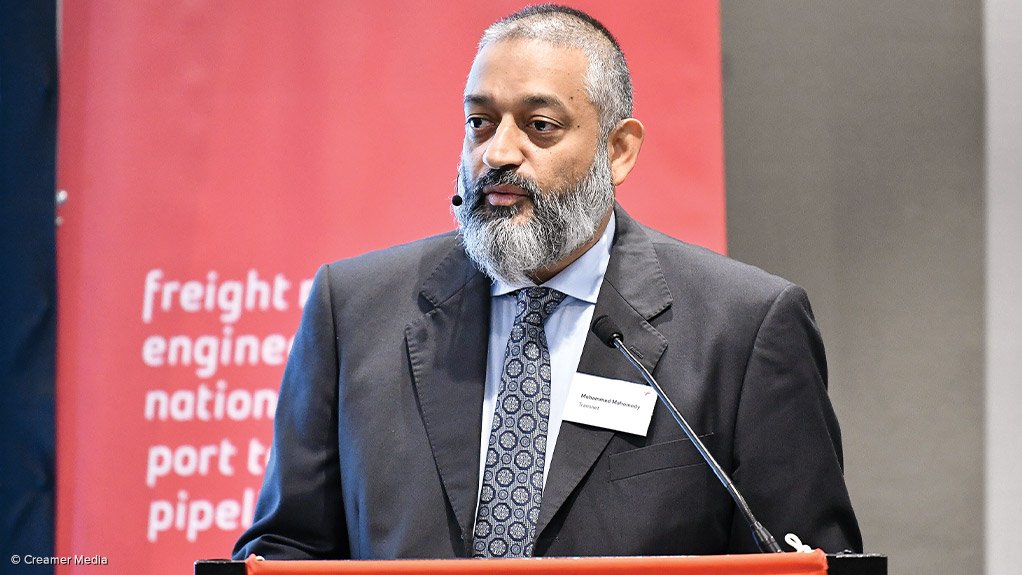/ MEDIA STATEMENT / The content on this page is not written by Polity.org.za, but is supplied by third parties. This content does not constitute news reporting by Polity.org.za.
The biggest winner out of Transnet’s multi-billion-rand locomotives contract in 2014 was Gupta-linked consultancy firm Regiments, which had not even been part of the original bid for the contract, but was slipped in through the back door with the help of Brian Molefe and Anoj Singh. The cost of the project had also shot up without reasonable explanation, and normal procurement processes flouted, with the board’s approval.
This is according to the parastatal’s acting group chief executive officer (GCEO), Mohammed Mahomedy, who testified before the commission of inquiry into state capture on Wednesday.
The project, one of its major transactions in recent years, was part of Transnet’s strategy to “create capacity ahead of demand”, and buy 1 064 new locomotives to augment its aging fleet, which was then nearing the end of the standard 30-year life span.
A request for proposals sent out in July 2012 yielded responses from several bidders, but the process had to remain closed until the approval of then public enterprises minister Malusi Gigaba, which came in April of the following year. “The process of approval within Transnet commenced around April 2013, where it went through the relevant management committees, then through to the sub-committees of the board, and then ultimately to the board who then made a submission to the shareholder minister.” The minister’s approval opened the path to the next phase, the evaluation process.
During the evaluation process, said Mahomedy, Transnet looked at a number of factors including BEE compliance, technical aspects and more, with Transnet Freight Rail (TFR) leading the process as the procuring division. A preferred bidder was chosen, approved by Gigaba, and the post-tender negotiations commenced in February 2014, with consultancy firm McKinsey assisting Transnet in the negotiations strategy. McKinsey had also formed part of the business case process, having been appointed to work with TFR in 2012.
But no sooner had the negotiations started, than a member of the McKinsey team informed Mahomedy of the company’s intention to withdraw from the process, citing discomfort with Transnet’s “rushed” approach to negotiations. “There was talk of a six-week negotiation period, which obviously did not make much sense when you give consideration to the fact that we are talking about one of the single biggest locomotive transactions in the world at the time,” said Mahomedy.
Following this, there was a purported cession agreement between McKinsey and Regiments. Purported, explained Mahomedy, because no clear document detailing terms of an agreement between the two companies has been found. A letter from McKinsey however, stating that all rights and obligations they had in the advisory role of the project were being ceded to Regiments, was sent to Transnet, and is the only clear indication of how Regiments came into the mix after the master service level agreement was signed.
The validity of McKinsey’s own status as a contractor at the time was also questionable, said Mahomedy, as the letter of intent from Transnet essentially appointing them as service providers for the advisory role, had itself expired. This puts the legality of the purported agreement between the two companies in question. Mahomedy believes that while the genuine negotiations took place in good faith, a parallel process was also happening that saw Regiments emerge to edge out McKinsey. He told the inquiry that through a review process of all high-level contracts of Transnet by the current board, Mahomedy came across a document that suggests that Singh and Regiments’ Niven Pillay entered into a contract in January, prior to the negotiations process, for the same services that McKinsey had been appointed for. The signed document is on the letterheads of both companies, an anomaly by Transnet’s procurement standards.
Despite this, the contract with McKinsey – initially valued at R35-million – increased over some time to about R280-million. “Regiments were the primary beneficiaries in that extension of value in time.”
The locomotives deal, now with Regiments, was concluded through a confinement in 2014 – motivated for by CEO Molefe directly with the board. This was after the initial tender process was abandoned. With the confinement approach, the project’s anticipated cost of R38-billion also shot up to R54-billion, a peculiar development, according to Mahomedy.
Until 2014, the procurement process for the locomotives project had been above board, with an extensive business case having been explored that considered factors like projected costs and positive financial yields for Transnet. The process was led by an enthusiastic Singh, who was chief financial officer at the time. TFR was the lead unit, and CEO Siyabonga Gama was in close consultation with Singh. McKinsey had been appointed to assist with the business case on an advisory basis back in 2012.
The business case called for a 50% representation of local content, and projected six years to the date of the delivery of locomotives. Its projected total cost of R38-billion also included R2.4-billion for contingencies, which is why Molefe’s projected cost increment is puzzling. “When we look at the complete business case that was submitted, we should have a 90% to 95% confidence level in the numbers that were proposed,” said Mahomedy. “If there was something that was extraneous, completely out of kilter with what we had projected … the R2.4-billion contingency would have given you that first room to manoeuvre.”
Unfortunately though, Singh, Gama and Molefe together had unconstrained powers with regard to the transaction, according to Mahomedy, and board approval meant that more funding would have to be sought to pay for the project.
Issued by Zondo Commission
EMAIL THIS ARTICLE SAVE THIS ARTICLE ARTICLE ENQUIRY
To subscribe email subscriptions@creamermedia.co.za or click here
To advertise email advertising@creamermedia.co.za or click here











